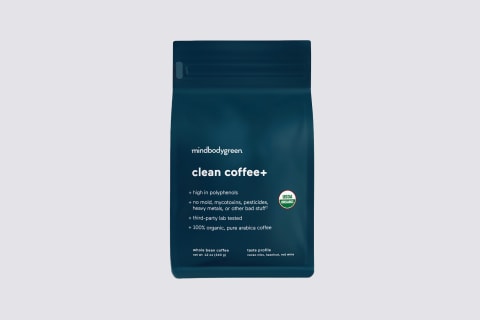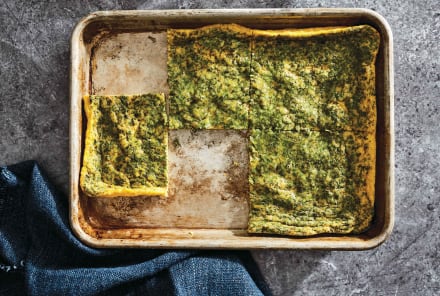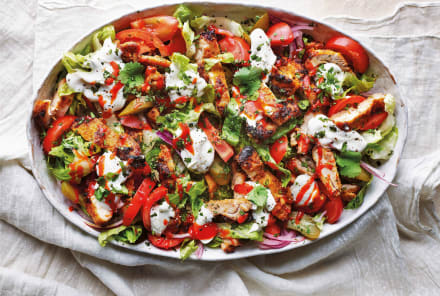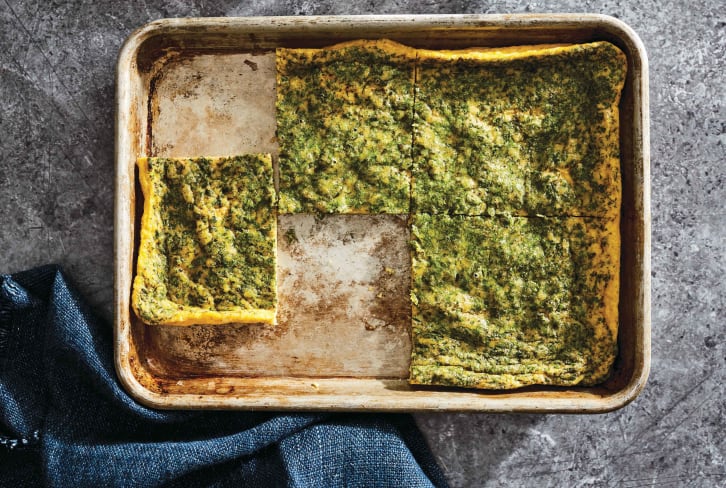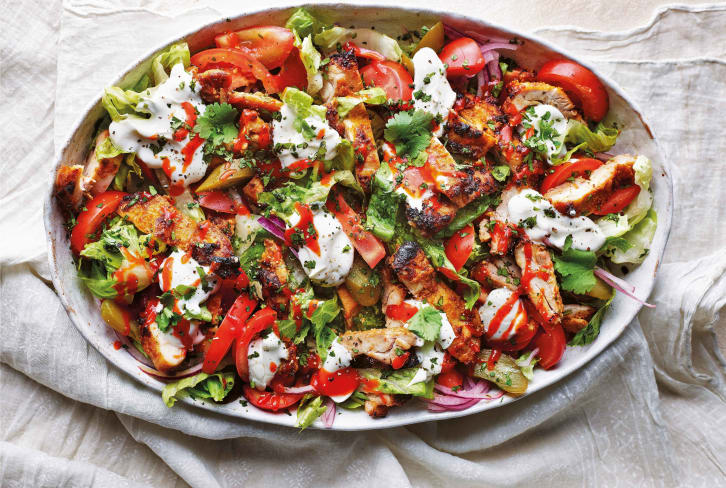Advertisement
Always Drink Coffee On An Empty Stomach? What Experts Want You To Know

Drinking coffee is linked to plenty of health benefits, from reducing the risk of liver disease to boosting cognitive health. However, how you drink coffee can get in the way of some of its perks. What about drinking coffee on an empty stomach? While some swear by drinking a cup of coffee first thing in the morning, others warn that drinking coffee on an empty stomach can wreak havoc on your hormones, stomach, and more.
Let's dive into the research to separate fact from fiction and determine whether it's safe to drink coffee on an empty stomach.
The need-to-knows:
- Yes, you can drink coffee on an empty stomach: According to current research, drinking coffee on an empty stomach is unlikely to cause significant health issues or adverse side effects in most people—as long as you're drinking it in moderation and not having it too close to bed.
- ... But it may trigger stress and digestive issues in some people: Drinking coffee on an empty stomach might trigger or worsen symptoms of certain health conditions, like anxiety, GERD, and other digestive issues. Doing so may also increase the cortisol response when consumed under stressful conditions.
- Just don't use coffee to replace breakfast: Even if you drink coffee on an empty stomach in the morning, be sure to still follow it up with breakfast. The first meal of the day is critical for energy, blood sugar balance, and more.
The research on drinking coffee on an empty stomach
Most of the research investigating the health effects of coffee focuses on coffee intake in general. There's not a ton of research looking into the effects of drinking coffee on an empty stomach. However, there are reasons to believe that it may impact the body differently compared to drinking coffee with food.
For stress:
One difference is that you might absorb caffeine more rapidly1 when drinking coffee on an empty stomach. When consuming coffee with food or even alongside a calorie-containing beverage, like a protein shake, the absorption of caffeine will be delayed because gastric emptying slows after eating nutrients2 like protein and fat.
If you drink a cup of coffee on an empty stomach, you're likely to absorb the caffeine much quicker, which may lead to some side effects, especially in people who are sensitive to caffeine to begin with.
"Drinking coffee on an empty stomach means you feel the effects of the caffeine in your body faster, so if you're sensitive to caffeine and experience side effects like restlessness, jitters, and anxiety, drinking coffee on an empty stomach can exacerbate these symptoms," Shilpa Ravella, M.D., gastroenterologist and author of A Silent Fire: The Story of Inflammation, Diet, and Disease, tells mindbodygreen.
For digestion:
Drinking coffee on an empty stomach may also trigger or worsen symptoms of gastroesophageal reflux disease (GERD) by decreasing the pressure of the lower esophageal sphincter (LES)3. The LES is a ring-like muscle at the lower end of the esophagus that prevents swallowed food from flowing back from the stomach and protects the esophagus from stomach acid.
"Coffee, which is an acidic beverage, can cause alterations in gastrointestinal motility and increase acid production in the stomach. Coffee also relaxes the lower esophageal sphincter and triggers heartburn, so patients with heartburn may want to avoid drinking coffee on an empty stomach if they find that it triggers their symptoms," Ravella explains.
However, it's unclear if drinking coffee on an empty stomach is any worse for people with heartburn and GERD compared to drinking coffee with a meal. Also, there's no evidence that coffee intake is linked to an increased risk4 of digestive conditions like ulcers, whether it's consumed on an empty stomach or not.
For hormones:
Another common argument against drinking coffee on an empty stomach is that it can negatively impact hormone levels, specifically the stress hormone cortisol. Again, research on this specific relationship is limited, though existing studies show that regular coffee intake doesn't seem to have much of an impact on cortisol levels.
For example, a 2023 study that included 148 people found no significant effects of regular caffeine use5 on baseline cortisol or reactivity. However, when consumed under stressful conditions, caffeinated beverages, like coffee, may increase cortisol response6 to the stressor.
No studies have compared the effects of drinking coffee on an empty stomach to drinking it with food on stress hormone levels, but since caffeine may increase cortisol levels and trigger anxiousness when consumed on an empty stomach, it may be best to lay off the coffee if you're having a particularly stressful morning.
Summary
Potential side effects
While everyone responds to coffee differently, drinking coffee on an empty stomach may lead to the following side effects:
It may worsen acid reflux
Due to its acidity and impact on LES pressure, coffee is a common trigger for digestive symptoms and conditions like acid reflux and GERD. If you drink coffee, whether it's on an empty stomach or not, it could worsen or trigger symptoms like reflux and nausea. That said, some people may find that drinking coffee on an empty stomach is more likely to aggravate digestive systems.
It could make stressful situations worse
As mentioned above, caffeinated coffee intake doesn't seem to have a significant impact on cortisol levels in general. A 2016 study published in BMC Nutrition found that consuming 200 milliliters of coffee containing 160 milligrams of caffeine had no impact on cortisol levels7, indicating that coffee ingestion did not increase stress levels under non-stressful conditions.
However, some research indicates that caffeinated coffee increases cortisol response6 in people exposed to stressful conditions. Coupled with its ability to trigger anxiety and jitteriness, it's best to minimize caffeinated coffee intake if you're feeling stressed or are going to have a stressful day.
It could stimulate the urge to poop
Studies show8 that around 33% of people feel a need to poop after drinking coffee. Substances found in coffee, like caffeine and polyphenols, act on the smooth muscles lining your gut and stimulate the urge to go to the bathroom. Theoretically, drinking coffee on an empty stomach may increase this effect since it's absorbed faster than it would be if it were paired with a meal.
It could reduce your appetite
If you drink coffee before a meal, it may suppress your appetite. A 2017 review published in the International Journal of Food Sciences and Nutrition found that consuming caffeine four hours to 30 minutes before a meal could help reduce calorie intake9. However, other studies have shown that drinking coffee alongside a meal10 could also help reduce calorie intake, which indicates that caffeinated coffee may help reduce energy intake in general.
This can become an issue if it leads you to skip breakfast. Research shows that regularly eating breakfast is associated with a reduced risk of cardiometabolic diseases like Type 2 diabetes11 and high blood pressure12, plus stabilized blood sugar and increased energy. So even if you do drink coffee on an empty stomach, you shouldn't think of it as a replacement for the most important meal of the day.
Who should avoid drinking coffee on an empty stomach?
While some people may be able to tolerate a cup of coffee on an empty stomach, others may find that drinking coffee before eating triggers nausea, reflux, or anxiety.
People with digestive conditions like GERD, acid reflux, or IBS may be particularly sensitive to coffee and may find that drinking it alongside a mixed meal works best for them. Additionally, those with other medical conditions, like anxiety, arrhythmias, high blood pressure, and insomnia, may want to cut back on their caffeine intake in general, as caffeine may worsen symptoms in these populations.
However, others may find that drinking a cup of coffee on an empty stomach first thing in the morning gives them energy and stimulates a healthy bowel movement. People practicing intermittent fasting may also find that sipping on a cup of black coffee during their fasting window makes the fast more tolerable.
If you find that drinking coffee on an empty stomach is too harsh on your digestive system or makes you feel jittery or anxious, consider pairing your coffee with a meal containing protein, cutting back on the amount of coffee you're drinking, or switching to decaf.
Summary
The benefits of delaying caffeine intake
If you find that drinking coffee on an empty stomach first thing in the morning upsets your system, you can also try delaying your caffeine intake by 90 to 120 minutes. Some health experts even say that doing so can also support your mood and energy levels.
Cortisol levels fluctuate throughout the day and night, with the lowest cortisol concentration occurring around midnight. After that, cortisol keeps rising into the morning hours and is usually at its peak around 9 a.m13.
Delaying caffeine intake may give your cortisol levels time to drop and give your body time to wake itself up naturally before introducing a stimulating substance. However, this depends on when you wake up, your work and sleep schedule, and more.
Currently, there's no evidence that waiting 90 to 120 minutes after waking to drink your coffee offers any significant benefits. But if you notice that you feel better when delaying your coffee intake after waking up, then that may be what's best for your body. Doing so may also better line up with your breakfast and make you less likely to drink coffee on an empty stomach.
The mindbodygreen POV
You can drink coffee on an empty stomach, though it may upset your digestion or exacerbate stress. Everybody reacts to caffeine differently, and though no research suggests that drinking coffee on an empty stomach is dangerous, it may not be the best decision for you.
If you find that drinking coffee on an empty stomach leads to any negative side effects, try drinking it with food, drinking less of it, or delaying your intake until 90-120 minutes after you wake up.
The most important thing to remember is that coffee shouldn't be used as a replacement for breakfast. Skipping breakfast can have negative consequences on your energy, appetite, and metabolic health in the long run. So even if you prefer to drink your coffee solo, be sure to follow it up with a well-balanced, protein-rich breakfast at some point.
—Emma Loewe, mindbodygreen Health & Sustainability Director
FAQ
Does drinking coffee on an empty stomach help you lose weight?
Studies show that drinking caffeinated coffee may help reduce your calorie intake at the next meal. However, you shouldn't use coffee as an appetite suppressant or depend on coffee to help you lose weight. Drinking too much coffee can lead to side effects like trouble sleeping and anxiety, so it's important to not overdo it. If you're trying to lose weight, it's best to focus on your diet and lifestyle as a whole and make healthy, sustainable changes that are best for your specific health needs.
Can drinking coffee on an empty stomach cause gastritis?
There's no evidence that drinking coffee on an empty stomach causes gastritis. However, it may worsen symptoms of some digestive conditions, like GERD. If you find that drinking coffee bothers your stomach, consider pairing your cup of joe with a meal.
Can you drink coffee on an empty stomach while fasting?
This is a personal decision. It's unclear how much a cup of black coffee impacts fasting, but many people who practice IF enjoy a cup of black coffee during their fasting windows without incident. That said, fasting purists argue that water is the only beverage that's OK to drink during fasting windows.
The takeaway
Existing evidence suggests that, for most people, drinking coffee on an empty stomach is A-OK. That said, people who are sensitive to caffeine and those with certain health conditions, like GERD, may want to cut back on coffee or pair theirs with a meal to reduce its stimulating effects.
If you're a fan of drinking coffee first thing in the morning, try one of these expert-recommended tips for making your morning brew easier on your body.
13 Sources
- https://www.ncbi.nlm.nih.gov/pmc/articles/PMC6247400/
- https://www.ncbi.nlm.nih.gov/pmc/articles/PMC6850045/
- https://pubmed.ncbi.nlm.nih.gov/32491384/
- https://www.ncbi.nlm.nih.gov/pmc/articles/PMC8778943/
- https://www.sciencedirect.com/science/article/abs/pii/S0306453023001804
- https://pubmed.ncbi.nlm.nih.gov/23504818/
- https://pubmed.ncbi.nlm.nih.gov/26979712/
- https://www.ncbi.nlm.nih.gov/pmc/articles/PMC7824117/
- https://pubmed.ncbi.nlm.nih.gov/28446037/
- https://pubmed.ncbi.nlm.nih.gov/23671022
- https://pubmed.ncbi.nlm.nih.gov/30418612/
- https://pubmed.ncbi.nlm.nih.gov/35284139/
- https://www.ncbi.nlm.nih.gov/pmc/articles/PMC4688585
Watch Next
Enjoy some of our favorite clips from classes
Enjoy some of our favorite clips from classes
What Is Meditation?
Mindfulness/Spirituality | Light Watkins
Box Breathing
Mindfulness/Spirituality | Gwen Dittmar
What Breathwork Can Address
Mindfulness/Spirituality | Gwen Dittmar
The 8 Limbs of Yoga - What is Asana?
Yoga | Caley Alyssa
Two Standing Postures to Open Up Tight Hips
Yoga | Caley Alyssa
How Plants Can Optimize Athletic Performance
Nutrition | Rich Roll
What to Eat Before a Workout
Nutrition | Rich Roll
How Ayurveda Helps Us Navigate Modern Life
Nutrition | Sahara Rose
Messages About Love & Relationships
Love & Relationships | Esther Perel
Love Languages
Love & Relationships | Esther Perel
What Is Meditation?
Box Breathing
What Breathwork Can Address
The 8 Limbs of Yoga - What is Asana?
Two Standing Postures to Open Up Tight Hips
How Plants Can Optimize Athletic Performance
What to Eat Before a Workout
How Ayurveda Helps Us Navigate Modern Life
Messages About Love & Relationships
Love Languages
Advertisement

How To Use Food To Recover From Autoimmunity: An MD's Top 4 Tips
Sara Szal Gottfried, M.D.
